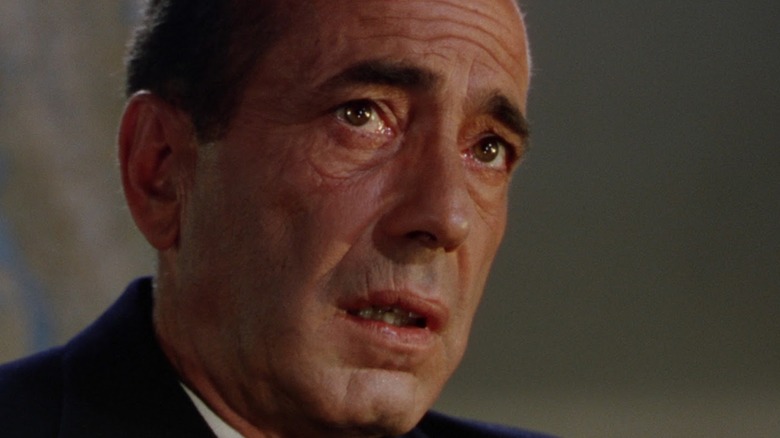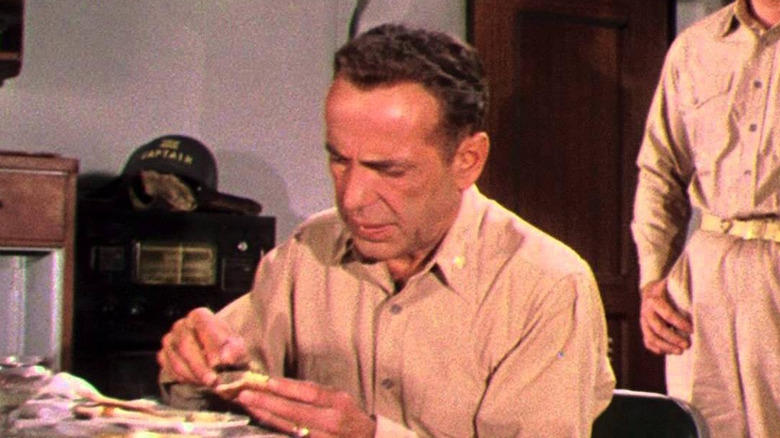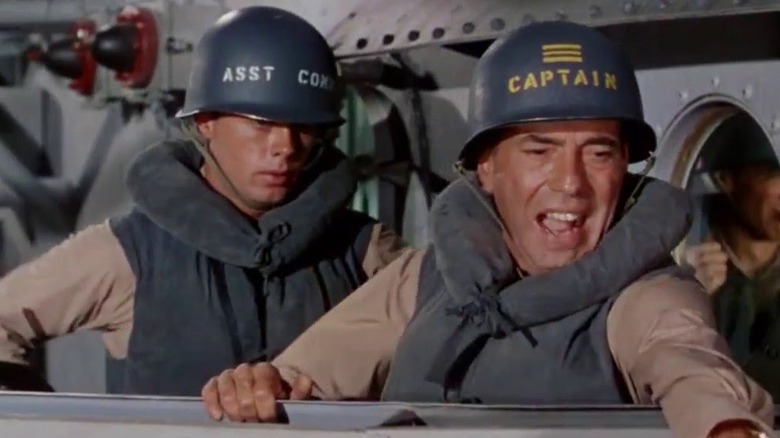The Caine Mutiny's Most Infamous Scene Sparked A Bizarre Battle Behind The Scenes
From "The Treasure of the Sierra Madre" to "Casablanca," the great Humphrey Bogart graced the silver screen with an array of performances that often see a hardened man unfurl by means of his inner demons. His Oscar-nominated turn in "The Caine Mutiny" is no different. The 1954 WWII naval drama, adapted from Herman Wouk's Pulitzer Prize-winning novel, sees Bogart as Lt. Cmdr. Philip Francis Queeg, the newly appointed Captain aboard the Navy slack ship known as the Caine, whose petty narcissism and obstinate leadership cause tension among the crew. Bogart does career-best work here, especially in his closing scene, which most likely secured him his nomination.
"The Caine Mutiny" is at its most riveting when the film disembarks the ship, and becomes a courtroom drama where we get to play judge and contemplate the morality of the titular mutiny. It seems so clear that Queeg was not fit to run the Caine, but the film poses the question if relieving the Captain could have been avoided. Director Edward Dmytryk tries to paint an "everyone's guilty" scenario by the end. To an extent, he's right. Fred MacMurray's Lt. Keefer ultimately plays both sides of an impossible scenario, which helps no one but himself. But between abandoning a mission, deflecting blame, and creating an overall toxic work environment, Queeg was always going to go down, whether he was on the ship that he'd have sunk or not. But the lynchpin that brings "The Caine Mutiny" full circle is the basis of Bogart's spectacular courtroom monologue: strawberries.
Whichever way you slice it
In perhaps one of the most memorable scenes of "The Caine Mutiny," Queeg gathers the ship's officers in the dining commons in the middle of the night because he believes that someone had swiped the remainder of the frozen strawberries. The Captain is so steadfast in his belief that someone forged a key that he won't accept otherwise, and plans to turn the ship upside down to prove its existence. Queeg invites Lt. Keefer and Lt. Maryk (Van Johnson) back to his quarters to further discuss how his experience with a similar food swiping incident backs up his persistence.
In a behind-the-scenes retrospective article from Turner Classic Movies, Scott McGee recounts how one little detail in this sequence unexpectedly caused some commotion behind the scenes:
"The Navy technical advisor, Commander James C. Shaw, grew upset with the way the character Captain Queeg butters his toast during the infamous "strawberry" scene. Shaw understood that Queeg was mentally unbalanced, but that didn't mean that he was not an officer and a gentleman. Shaw figured that any officer who graduated from Annapolis would know the military standard for breaking a slice of bread into small pieces before buttering it. Unfortunately, Bogart (in the role of Queeg) felt like Shaw was personally attacking his performance and became agitated. To placate both parties, the crust was trimmed from the bread, thus reducing the size and satisfying both Bogart and the Navy."
It's very fitting that a situation, which demonstrates the fruitless nature of being stubborn over something so small, is so similar to Queeg's mission. What makes this whole thing so bizarre is that the compromise they arrived at was to make the toast in question look even more noticeable. What kind of psychopath butters toast with the crust cut off? If you wanted to, you could view it as another way Queeg claims to adhere to strict Navy protocols, but nimbly goes about his own way of doing things.
The Navy way or no way
In order to work alongside the military and have access to the ships they needed, producer Stanley Kramer ("Judgment at Nuremberg") and Columbia Pictures' Harry Cohn had to abide by the following notes from the U.S. Navy (via TCM):
"The enlisted men would not be presented as unintelligent, unkempt, or as scurvy misfits; Captain Queeg's cowardice would be minimized and his character made more sympathetic; the film would open with a disclaimer that read, "There has never been a mutiny in the United States Navy. The truth of this story lies not in its incidents but in the way a few men meet the crisis of their lives." The Navy also wanted the word mutiny dropped from the title but, luckily, Kramer prevailed against this request as so many people were already familiar with the Wouk novel."
Of course, like any Hollywood production, you have to roll with the military's concessions if you want to play with their big metal toys. In this case, I suppose it also refers to how your fictional Naval Captain butters his weirdly sliced toast. Despite the Navy's best efforts, I don't think the film did a great job at hiding Queeg's cowardice at all. His natural instinct of being an impossible perfectionist is on full display, as are his cold feet when something goes wrong. He just tries to brush off his erratic behavior by means of a "let's just forget about this and move on"-type of mentality, notably toward the young Ens. Keith (Robert Francis).
What did shine through, however, is Queeg's vulnerability. Even though Lt. Maryk's life-or-death decision is justified, the frightened look on Bogart's face, both during the Caine mutiny and the court martial, is that of a man who desperately deserves help after all of the wartime trauma he's been carrying. And for those brief moments, the film's "villain" is shown to be a flawed man, who recognizes the extent of his conceitedness for the first time in his life.


